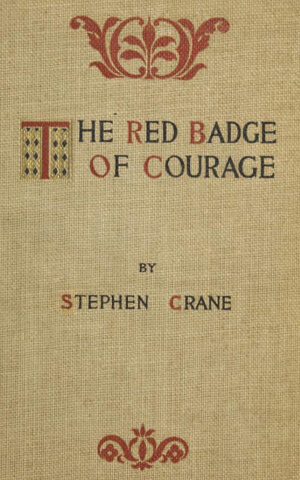The Red Badge of Courage written by Stephen Crane in 1895 is a fictional novel that explores the philosophical mindset of a young soldier, who finds himself facing combat for the first time. Set during the American Civil war, the novel follows the thoughts and actions of a young Unionist Private Henry Fleming, as he mentally prepares himself for his first battle.
Private Fleming – often referred to as ‘The Youth’ enlists in the Union Army in search of fame and glory, however, is quickly filled with self-doubt as he finds his preconceived ideas of courage largely untested. During his first skirmish the youth is overcome with fear and flees. Later, unable to live with the knowledge of his cowardice and the judgement from others, Fleming returns to battle in search of proving his bravery, with a ‘red badge of courage’.
The Red Badge of Courage is a must read for all military personnel and especially relevant for junior officers. It touches on what is all too often ‘taboo’ subjects within the military, namely perceived cowardice, false bravado, and fear. This allows the reader to consider how they themselves may respond to such a situation. This novel goes into extreme depth in relation to the mental battles all personnel will face prior to their first engagement and leaves the reader all too aware of their own lack of experience.
Aside from the mental conflict and doubt within the individual, the Red Badge of Courage also explores additional ongoing contingencies of war, and how these in turn impact the mental resilience of soldiers. As a junior officer it is important to understand these phenomena and seek to reduce their impact wherever possible. Three key aspects that I have drawn from this novel are the fog of war, battle fatigue and the dehumanisation of the enemy.
The Fog of War.
Defined as the ‘uncertainty in situational awareness experienced by participants in military operations’, the fog of war is a very real phenomenon that causes fear and questioning within all levels of military. The novel initially explores this humorously, with the soldiers unsure of where they are going and when they will stop marching; however, this intensifies in combat through to why are they fighting and when will it end. Lack of clear direction and information will result in disgruntled personnel who are unable to understand the larger picture and purpose.
Battle fatigue.
The novel touches on the initial symptoms of battle fatigue and the effect on an individual from prolonged exposure to combat. During the ongoing skirmishes that the youth is forced to face he develops an intense hatred for both the officers (for not reinforcing or relieving them) and the enemy (for continually attacking them). Over the course of the novel this stress intensifies and ultimately alters his state of mind in a form of PTSD. It is crucial to be aware of the symptoms and effects of combat stress reaction, and wherever possible, remove and rotate personnel as required.
Dehumanisation of the enemy.
This becomes a reoccurring trend towards the end of the novel with Fleming labelling the enemy as monsters in the dark, capable of all manner of feats. Albeit, within the novel, this knowledge is used to grip the youth, and enable him to conquer his fears, it does draw into question the additional side effects of such beliefs. While dehumanisation may allow the soldier to fight the enemy when required, it also creates an atmosphere where it is acceptable to commit atrocities outside of war. This is evidenced across all conflicts and can be closely linked to the effects of combat stress reaction. Establishing a correct understanding of the enemy can lessen this belief and ultimately reduce the impacts of unknown fears.
Conclusion.
No amount of training can ultimately prepare military personnel for the realities of conflict, and nobody knows prior to their first engagement how they will respond. The Red Badge of Courage addresses these concerns through the eyes of someone experiencing it for the first time, someone who ultimately cannot live up to the high standards that they imposed. The result of the failure in this preconceived inaccurate belief is addressed through the mental breakdown highlighted within the novel and should be read and analysed by all serving personnel. The Red Badge of Courage will test the preconceived ideas of the reader, and ultimately leave them with a better understanding of both their own mental state, and the state of those around them.
About the Author: Michael Turner is an Ordnance officer currently posted to the 1st Regiment, RAA.

